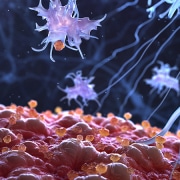GEP fellow publishes new study
The benefits of involving young people in genome sequencing decision making are explored by GEP fellow Dr Celine Lewis in her recently published study
One of the Genomics Education Programme’s research fellows, Dr Celine Lewis, has published new research into good practice for young people making decisions about genome sequencing for rare diseases.
Importantly, the study found that involving young people in these sorts of discussions is likely to lead to them taking more responsibility for their health and healthcare decisions.
Understanding the participants
The authors of the study interviewed 27 young people aged 11 to 19 who were having genome sequencing as part of the 100,000 Genomes Project.
Most of the young people correctly understood that only some people get a diagnosis and were realistic about the limitations of genome sequencing, with around half saying that a diagnosis was unlikely to have a significant impact for them individually.
Despite this, participants also recognised the validation that a diagnosis could bring: “I’d like to put a label on it, because it’s hard to explain to other people and it’s almost like people think ‘Oh, she hasn’t got a diagnosis so she hasn’t got anything wrong’.”
Participants cited a variety of benefits from taking part in the 100,000 Genomes Project, including getting a diagnosis, discovering if their condition was inherited and finding out whether they might pass it on to their own children.
The maturity of the participants was also reflected in their thoughts about the psychological benefits of genome sequencing, such as wanting an “answer … to put a few questions to rest” or to gain “closure”.
Young people were also motivated by factors other than their own health, such as helping other people and contributing to science.
The importance of inclusivity
The researchers found that involving young people in the discussion about whether they would have genome sequencing, including asking them to sign an ‘assent form’, gave them a sense of responsibility for their choice to participate.
Those who had not been asked to sign a form said that they would have valued the opportunity to do so: “If I signed it, the questions that were being asked on the form, I might have understood more what was going to happen.”
When they were asked about receiving adult-onset secondary findings (findings that are additional to the main reason for testing, and can be treated, such as genetic variants linked to cancer or heart disease), most participants had consented, but noted that “just because there’s a possibility [of getting cancer or heart disease], doesn’t mean it will happen”.
Reasons for wanting to receive such findings included the need for a sense of control, and the potential to change behaviour in light of the findings, for example, stopping smoking or eating sugary foods if they were found to be at increased risk.
Most participants who had consented to receive adult-onset secondary findings reported that they were made without parental influence and were keen to show their autonomy. One participant said, “I feel like I was responsible enough to make that decision myself”.
This study – the first to investigate young people’s views of participating in genome sequencing – shows how important it is that healthcare professionals make efforts to involve young people in decision-making about this technology. In particular, the study authors recommend that written assent is good practice and should continue.
A copy of the paper is available to read on the ScienceDirect platform.
This article was adapted from one originally written and circulated by the patient group Genetic Alliance UK
–
Please note: This article is for informational or educational purposes, and does not substitute professional medical advice.









